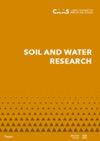Effects of rainfall and the slope gradient on the soil and water loss in a purple soil area
IF 1.7
4区 农林科学
Q4 SOIL SCIENCE
引用次数: 1
Abstract
Soil and water losses in purple soil area is becoming an increasingly severe problem, bringing enormous challenges to environmental protection in rural areas. In this study, simulated rainfall experiments were conducted to analyse the effects of rainfall and the slope conditions on the soil and water loss. Purple soil from a typical slope in the Beibei District of Chongqing was selected as the experimental soil. Twenty rainfall scenarios with varying rainfall intensities and slope conditions were created in the simulation. The results indicate that the runoff initiation time shortened with an increased rainfall intensity and slope gradient. There was a logarithmic relationship between the effect of the rainfall amount on both the runoff intensity and sediment yield intensity. Generally, both the runoff and sediment yield showed a positive linear relationship with the rainfall intensity under different slope gradient conditions. In terms of the same rainfall intensity, both the runoff intensity and sediment yield intensity increased with the slope. Furthermore, a critical slope gradient for the soil and water loss was found between 20° and 25°. This study aimed to provide a reference for soil and water conservation research in a purple soil area.降雨和坡度对紫色土水土流失的影响
紫色土地区水土流失问题日益突出,给农村环境保护带来了巨大挑战。本研究通过模拟降雨试验,分析了降雨和边坡条件对水土流失的影响。选取重庆市北北区某典型边坡的紫色土为试验土。模拟中创建了20个不同降雨强度和坡度条件的降雨场景。结果表明,随着降雨强度和坡度的增加,径流起始时间缩短。降雨量对径流强度和产沙强度的影响呈对数关系。总的来说,在不同坡度条件下,径流和产沙量与降雨强度呈正线性关系。在相同降雨强度下,径流强度和产沙强度均随坡度的增加而增加。此外,水土流失的临界坡度在20°至25°之间。本研究旨在为紫色土地区的水土保持研究提供参考。
本文章由计算机程序翻译,如有差异,请以英文原文为准。
求助全文
约1分钟内获得全文
求助全文
来源期刊

Soil and Water Research
Water resources, Soil Science, Agriculture-WATER RESOURCES
CiteScore
4.60
自引率
0.00%
发文量
26
审稿时长
>12 weeks
期刊介绍:
An international peer-reviewed journal published under the auspices of the Czech Academy of Agricultural Sciences and financed by the Ministry of Agriculture of the Czech Republic. Published since 2006.
Thematic: original papers, short communications and critical reviews from all fields of science and engineering related to soil and water and their interactions in natural and man-modified landscapes, with a particular focus on agricultural land use. The fields encompassed include, but are not limited to, the basic and applied soil science, soil hydrology, irrigation and drainage of lands, hydrology, management and revitalisation of small water streams and small water reservoirs, including fishponds, soil erosion research and control, drought and flood control, wetland restoration and protection, surface and ground water protection in therms of their quantity and quality.
 求助内容:
求助内容: 应助结果提醒方式:
应助结果提醒方式:


